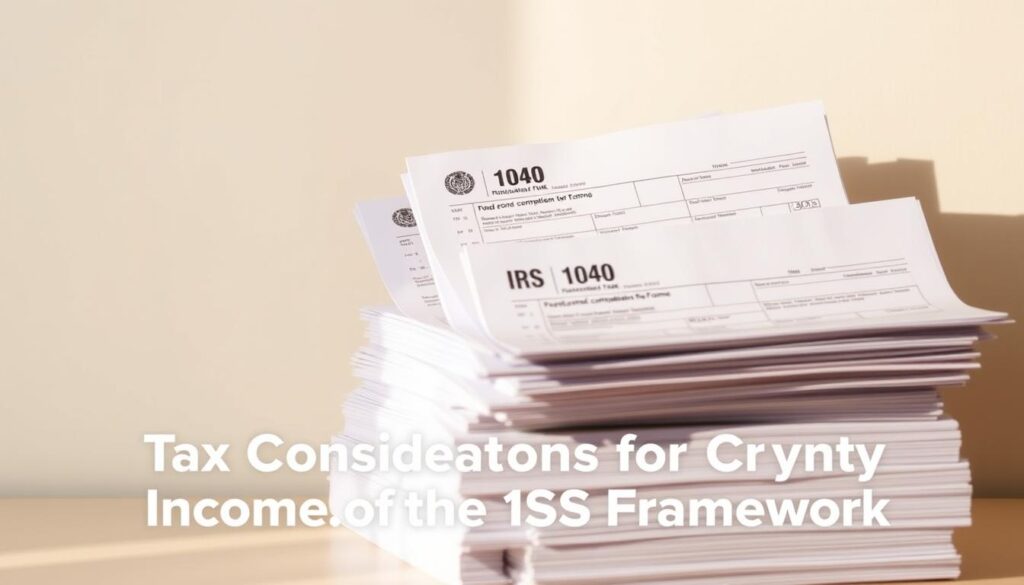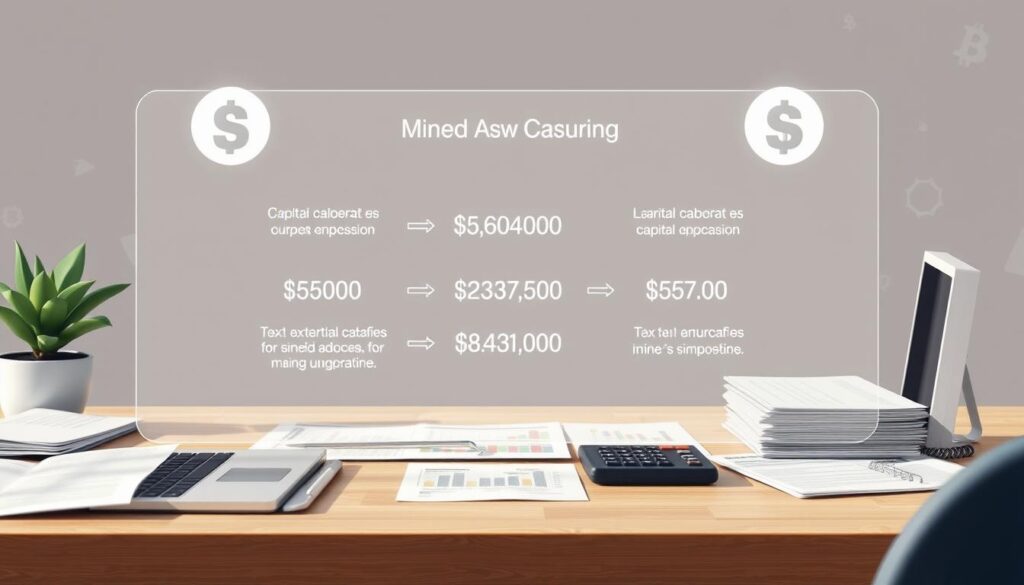Crypto mining makes money by using computational power. But, it comes with special tax rules. The IRS sees cryptocurrency as property, so mining income is taxed like any other property.
Whether you mine for fun or as a job, you must understand the tax rules. This is to avoid legal trouble.
Not following tax rules can lead to fines. The IRS wants miners to report all earnings, including transaction fees and sold coins. You need to keep track of each transaction’s value and file forms like Form 8949.
The tax rules change based on if mining is a business or a hobby. This affects what you can deduct and how you report your income.
Key Takeaways
- Tax obligations apply to all crypto mining income, regardless of scale.
- The IRS classifies cryptocurrency as property, affecting how mining profits are taxed.
- Miners must report mining rewards and sales on tax forms like Form 8949.
- Cryptocurrency tax implications depend on whether mining is a business or hobby.
- Non-compliance risks include audits, penalties, and back taxes owed.
What Qualifies as Taxable Crypto Mining Income
All cryptocurrency mined or earned through proof-of-work activities is taxable income, according to IRS guidelines. Miners must report crypto mining income when they receive rewards, even if the coins are held long-term. This rule applies to both new coins and fees collected during network transactions.
Fair Market Value Taxation Principles
The IRS values mined cryptocurrency at its fair market value on the day it’s received. For example, Bitcoin mined when its price is $30,000 becomes taxable income at that exact amount. This rule applies to all taxable events in crypto mining, including altcoins and network fees.
Mining Rewards vs Transaction Fees
Block rewards for validating transactions and transaction fees collected from users are both taxable. Miners must report crypto mining income from both sources separately. Even fees in small denominations like gas tokens qualify as taxable revenue.
Determining the Value of Mined Coins
- Use cryptocurrency exchanges for widely traded assets (e.g., Bitcoin, Ethereum)
- Third-party pricing services for niche coins
- Historical price charts for volatile markets
Documentation of these valuations is critical for reporting crypto mining income accurately. Failure to track FMV at time of receipt risks audit issues.
How the IRS Classifies Cryptocurrency Mining Activities
The IRS regulations on crypto mining sort mining into two groups. They look at what you aim to do and how you set up your mining. Notice 2014-21 says mining income is treated like property. But, if you do it as a business or just for fun, it affects how you report it.
The IRS checks a few things. They look at how much time you spend, if you make a profit often, and if you’re trying to make money. This helps them decide if you’re in business or just having fun.
Being in the trade or business means you file Schedule C. But, if you’re just doing it for fun, you only report the profits. The main differences are:
- Businesses have special setups, like dedicated equipment and staff.
- Those who mine sometimes and make a little profit might be seen as hobbies unless they keep making money.
Tax courts look at your goals. The IRS regulations on crypto mining want to see if you’re trying to make money. This means having a business plan or always trying to get better.
The IRS has a nine-factor test. They check if you make profits more than once. This helps them decide if you’re serious about making money.
Miners need to keep track of their costs. This includes things like electricity, hardware, and software. If you ignore these rules, you might end up paying more in taxes or facing penalties. The IRS might check if you’re really running a business or just messing around.
Tax Considerations for Crypto Mining Income: The IRS Framework
It’s key to know the IRS regulations on crypto mining for tax filing for crypto miners. The IRS has rules for reporting income. This makes sure you follow federal tax laws.

Form 8949 and Schedule D Requirements
Miners selling crypto must use Form 8949 to report sales. Then, they move the info to Schedule D. This helps track costs and profits from sales. Not reporting can result in penalties.
Schedule C for Business Mining Operations
Business miners file Schedule C. It shows income and deductions. You can deduct things like hardware, electricity, and software costs. Mining profitably for two years shows you’re in business, says the IRS.
When Mining Constitutes a Trade or Business
- Profit history: Consistent earnings signal business activity
- Time invested: Significant hours dedicated to mining operations
- Intent to profit: Document business-like practices like marketing or record-keeping
The IRS looks at these points to decide if mining is a business. Getting it right means you follow IRS regulations on crypto mining and file taxes correctly.
Hobby Mining vs. Business Mining: Tax Implications
For crypto miners, knowing if you’re doing it for fun or as a business is key. This affects what you can deduct, how you report, and your cryptocurrency tax implications. The IRS looks at your goals and how you set up your mining to decide if it’s a hobby or a business. This decision is crucial because getting it wrong can lead to fines.
The Nine-Factor Test for Business Classification
- Regular activity conducted in a business-like manner
- Time and effort invested in improving profitability
- History of turning a profit in prior years
- Expectation that asset value will rise
- Past losses tied to startup expenses
- Proof of learning through experience
- Successful efforts in similar ventures
- Reliance on income from the activity
- Lack of personal pleasure from the activity
Profit Motive Documentation Requirements
- Business plans outlining revenue goals
- Separate bank accounts for mining income/expenses
- Written records of operational improvements
- Year-end profit/loss statements
For example, a miner working 24/7 with better equipment is likely seen as a business. On the other hand, someone mining casually at home might be seen as a hobbyist. To switch from hobby to business, you need to make your mining more formal. This includes updating your records and showing you’re serious about making a profit.
Self-Employment Taxes for Professional Crypto Miners
Professional cryptocurrency mining as a business means you have to pay self-employment taxes. These taxes are for Social Security and Medicare, adding up to 15.3% of your earnings. You must pay these taxes if you make more than $400 a year from mining.
- Filing Schedule SE to calculate taxes
- Quarterly estimated payments to avoid penalties
- Reporting on Form 1040, line 15
How you set up your business affects your taxes. Sole proprietors and partnerships pay self-employment taxes directly. LLCs taxed as sole proprietorships have the same rules. Partners in mining operations split the tax liability based on their share.
For example, if a miner makes $60,000 net income, they pay $9,180 in taxes (15.3% of $60,000). You can lower your taxable income by deducting things like hardware costs or electricity. Also, retirement contributions to SEP-IRAs can reduce what you have to pay in taxes.
Not paying enough taxes can lead to penalties. You need to keep track of all your income and expenses. Use software like QuickBooks or CoinTracker to stay on top of your finances.
Capital Gains Considerations When Selling Mined Cryptocurrency
Miners face capital gains tax on mined cryptocurrency rules when selling. These cryptocurrency tax implications vary based on how long you held it, its cost basis, and your income. Keeping track of these details helps you follow the law and pay less in taxes.

Short-term vs. Long-term Holding Periods
Coins held for less than a year are taxed as income. But, if you hold them more than 12 months, you get lower tax rates. For example, Bitcoin mined in January 2023 and sold in June 2024 gets these lower rates.
- Short-term: Taxed at ordinary income rates (up to 37%)
- Long-term: Rates range 0%, 15%, or 20% based on taxable income
Cost Basis Calculation Methods
The cost basis of your mined cryptocurrency starts with its value when you got it. You also add in mining costs like energy, hardware, and pool fees. For fork coins, the basis is their value at the fork date.
Tax Rate Differences Based on Income Brackets
In 2023, long-term gains tax rates change with your income:
- $44,625 or below: 0%
- $44,626–$497,350: 15%
- Above $497,350: 20%
Those in higher tax brackets can save by holding onto their assets for more than a year.
Using tax-loss harvesting or FIFO can help with basis calculations. Getting advice from a tax expert ensures you follow IRS rules and save money.
Deductible Mining Expenses That Can Reduce Your Tax Burden
Tax deductions for mining expenses can help lower your taxable income. Miners who run their operations as businesses can claim costs directly related to their work. Keeping detailed records is key to staying compliant and saving money.
- Equipment costs: Buying new equipment can be deducted under Section 179 or depreciated over time. In 2023, you can expense up to $1,070,000, with the rest spread over 5 years.
- Electricity costs: Use smart meters or analyze utility bills to track mining energy use. If you use it for both mining and personal stuff, split the costs.
- Facility costs: Rent, property taxes, and upgrades for mining areas are fully deductible. But, if your space is used for both, you need to show how much is for mining.
- Operational expenses: Mining software, pool fees, maintenance, and internet costs are deductible. Even legal or accounting fees for your mining business can be claimed.
- Education and training: Courses and certifications that improve your mining skills are business expenses.
When your equipment or space has more than one use, you can only deduct a part of it. For instance, if 60% of your home office is for mining, you can deduct 60% of related costs. The IRS wants to see detailed records to back up your claims.
Keep all receipts, invoices, and logs of usage. This helps you pass audits. It’s also wise to talk to a tax expert to make sure you’re using mining expense deductions right. With the right planning, you can lower your taxes and avoid penalties.
Record-Keeping Requirements for Crypto Mining Operations
Keeping accurate records is crucial for miners to follow reporting crypto mining income and make tax filing for crypto miners easier. The IRS demands detailed records of all transactions, including mined coins and pool distributions. This ensures miners follow federal guidelines found in IRS digital asset tax rules.
Tracking Mining Pool Distributions
Miners need to track pool payouts carefully. Record reward dates, hashrate contributions, and fees taken by pools. Use spreadsheets or software to track irregular payouts and minimum thresholds.
Keep detailed records of how rewards are split to avoid issues during audits.
Software Solutions for Tax Compliance
Special tax software helps track mining rewards and expenses. Look for tools that import pool data, calculate costs, and export IRS forms. Features like exchange/pool integration make reporting easier and reduce errors.
Regular backups are key to keeping data safe for audits.
Documentation Needed for an IRS Audit
- Reward logs with timestamps and fair market values at receipt
- Proof of equipment purchases and maintenance costs
- Pool agreements outlining reward distribution methods
- Business intent documents like profit strategies or marketing plans
Keep records for at least six years, as IRS audits can cover multiple tax years. Don’t try to recreate data later—track transactions in real time for accuracy.
Mining as Part of an LLC or Corporation: Tax Advantages

Cryptocurrency miners can lower tax risks and expand their operations by setting up legal entities like LLCs or corporations. The right structure impactstax considerations for crypto mining incomeand access totax deductions for mining expenses. Important factors include liability protection, cost, and profit tax rates.
Entity Selection Considerations
- LLCs: Protect personal assets and offer flexible tax choices. Miners can choose to be taxed as sole proprietors or corporations.
- C-Corporations: Allow profits to be reinvested with corporate tax rates (21% federal). But, there’s double taxation if dividends are given out.
- S-Corporations: Skip double taxation by passing income directly to shareholders. But, there are ownership limits.
Pass-through Taxation vs. Corporate Taxation
Pass-through structures (LLCs, S-Corps) report profits on individual tax returns, avoiding corporate tax rates. C-Corps pay taxes at the entity level, then shareholders pay again on dividends. For instance, a mid-sized mining operation in Texas might pick an LLC for easiertax deductions for mining expenseslike hardware depreciation and energy costs.
Real-world examples show LLCs are favored by small miners for their simplicity. On the other hand, C-Corps are chosen by large-scale operations to delay taxes through retained earnings. The choice also affects health insurance deductibility and access to retirement plans like Solo 401(k)s.
Miners should talk to experts to match entity selection with their growth goals and state rules. The right setup protects assets and saves on taxable income.
Quarterly Estimated Tax Payments for Crypto Miners
For tax filing for crypto miners, you must make quarterly payments to avoid penalties. The IRS wants these payments as you earn income, not just at the end of the year. You need to pay by April 15, June 15, September 15, and January 15. These dates might change if there are holidays.
- Safe harbor: 110% of prior year’s tax (if income stays stable)
- Projection: 90% of current year’s expected tax
Changes in crypto prices make reporting crypto mining income tricky. To manage, miners might save profits or use stablecoins. If you don’t pay enough, you’ll face penalties, including interest on unpaid taxes.
Miners must file Form 1040-ES and check state rules, which might be different from federal ones. Missing payments can lead to fines. Getting help from a tax expert ensures you follow IRS and state rules.
To do tax filing for crypto miners right, keep track of your income and expenses. Use software to monitor crypto values and meet deadlines. With good planning, you can avoid penalties and stay legal.
State Tax Considerations for Mining Operations
State tax rules add another layer to the tax considerations for crypto mining income. The IRS sets federal standards, but states have their own rules. This affects everything from buying equipment to reporting income. Miners must understand these state policies to avoid penalties and save money.
Mining-Friendly States with Tax Advantages
States like Texas, Wyoming, and Florida have low taxes. They don’t tax personal income, which lowers costs. Wyoming even made crypto exempt from property taxes. Miners in these places save money and face clearer rules.
- No income tax in Texas, Florida, and Nevada
- Wyoming’s crypto-friendly property tax exemptions
- States with energy incentives for mining equipment
State-Level Reporting Requirements
Reporting rules differ by state. Some, like California, treat crypto as taxable income but lack specific guidance. Miners must follow IRS rules. New York requires more disclosures.
Operations in multiple states must follow each state’s rules. This includes where equipment is used versus where the owner lives. Sales tax may apply to equipment purchases. Large operations could face property taxes on their hardware. Always check with local tax authorities to stay compliant.
International Tax Implications for Global Mining Operations
American miners working abroad have special cryptocurrency tax implications under U.S. laws. The IRS rules on crypto mining apply worldwide to U.S. citizens and residents. They must report mining income earned abroad, even if it’s not in the U.S.
Forms like FBAR and FATCA are required for crypto mined in other countries. This is true for accounts that hold such mined crypto.
Tax rules decide where income is taxed. Miners might face double taxation if other countries also tax their income. The foreign earned income exclusion might not cover mining rewards.
International tax treaties could lower U.S. taxes on crypto income earned abroad. Foreign tax credits can also help if taxes are paid twice.
Non-U.S. miners with U.S. customers or assets might face 30% withholding taxes under FATCA. This is unless they file the right documents. Moving operations offshore doesn’t mean U.S. persons are exempt from reporting.
Exit tax rules apply if assets are moved out of the country. Major mining hubs like Canada and Russia have different tax rules. For example, Iceland has low energy costs, while China bans mining.
- Reporting Requirements: File Form 8949 with global mining data
- Country Examples: Canada taxes mined crypto as business income; Russia imposes 13% flat tax on transactions
- Audit Risks: Cross-border transactions increase scrutiny from IRS
Miners must follow both global IRS regulations on crypto mining and local laws to avoid penalties. It’s important to consult tax experts who know about cross-border crypto compliance.
Common Filing Mistakes Crypto Miners Should Avoid
Getting your taxes right for crypto mining means avoiding mistakes that catch the IRS’s eye. Many miners miss important details, like what’s taxable in crypto mining. This can lead to penalties. Here’s how to keep your taxes in order:
- Under-reporting Mining Income: Small rewards or pool payouts are often missed. Every mined coin or fee is income. Value all rewards at fair market value when you get them to avoid underreporting.
- Ignoring Basis Tracking: Selling crypto without tracking purchase costs can lead to wrong gains. Use software to keep track of basis for audits. Without this data, you might overpay taxes or face penalties.
- Misclassifying Expenses: Claiming personal equipment as business expenses is against IRS rules. Only document expenses directly related to mining. Wrong deductions can lead to audits.
Mistakes like these can cost you interest and fines. Use special tools to log transactions and get help from experts for crypto miner taxes. Being accurate is key to avoiding expensive mistakes.
Strategic Tax Planning for Future Mining Ventures
Good tax planning is key to a mining operation’s success. Miners should focus on tax deductions for mining expenses and keep up with cryptocurrency tax implications. Buying equipment at the right time can lower taxable income with Section 179 deductions.
Expanding operations might mean changing business structures. This could be to LLCs or corporations to get better tax rates and protect assets.
Choosing where to mine is also important. States with low energy costs and tax breaks can save money in the long run. Selling mined coins at the right time can also save on taxes by avoiding high capital gains rates.
Retirement accounts like solo 401(k)s can protect profits from taxes. Estate plans are crucial for handling crypto transfer taxes.
Staying flexible with changing rules is essential. Tax experts can help set up entities to handle new regulations. Keeping track of expenses is vital for compliance and getting the most deductions. Miners should use crypto tax software to record all transactions accurately.
FAQ
What are the tax considerations for crypto mining income?
When it comes to crypto mining income, you need to know a few things. First, mined coins are seen as ordinary income when you get them. You must also follow fair market value rules. Plus, you’ll have to deal with self-employment taxes.
Miners must report their mining rewards on specific IRS forms. These forms depend on how big your operation is and if you’re running a business.
How does the IRS classify cryptocurrency mining activities?
The IRS looks at mining activities in two ways: as a trade or a hobby. They check if you’re trying to make a profit and how big your operation is. This affects your taxes, like what you can deduct and if you have to pay self-employment taxes.
What tax forms should I use for reporting crypto mining income?
To report crypto mining income, you’ll use Form 8949 for selling mined cryptocurrency. You’ll also need Schedule D for capital gains. If you’re running a business, you’ll use Schedule C to report income and deduct expenses.
Are there tax deductions available for mining expenses?
Yes, you can deduct mining expenses. This includes things like equipment costs, electricity, and software fees. You need to keep good records to prove these deductions.
What are the self-employment tax implications for professional crypto miners?
If you’re a professional miner and self-employed, you’ll pay self-employment taxes. This includes both the employer and employee parts of Social Security and Medicare taxes, which add up to 15.3%. You’ll also need to make estimated quarterly tax payments to avoid penalties.
How do I calculate capital gains tax on sold mined cryptocurrency?
To figure out capital gains tax, you need to know the selling price and the fair market value at the time you got the coins. The difference is your gain. If you held the coins for a short time, you’ll pay a higher tax rate.
What is the importance of proper record-keeping for crypto miners?
Keeping good records is key for crypto miners. It helps you report income and expenses right and pass IRS audits. You should keep records of mining rewards, transaction histories, and all supporting documents for deductions.
Are there any common tax filing mistakes that crypto miners should avoid?
Yes, there are mistakes to watch out for. Don’t under-report mining income or forget to track cost basis for mined coins. Also, be careful not to claim business expenses incorrectly. Accurate documentation and reporting can help avoid penalties.
What are the international tax implications for miners operating globally?
Miners working globally face U.S. reporting rules for foreign accounts, double taxation, and international tax treaties. It’s important to understand how your residency and mining operations affect taxes in different places.
How can I strategically plan for future tax obligations related to mining?
For tax planning, consider timing equipment purchases for depreciation benefits. Think about the best business structure for tax savings. Also, know how selling mined rewards can affect your tax bracket. Getting advice from tax pros who know cryptocurrency is a good idea.


No comments yet